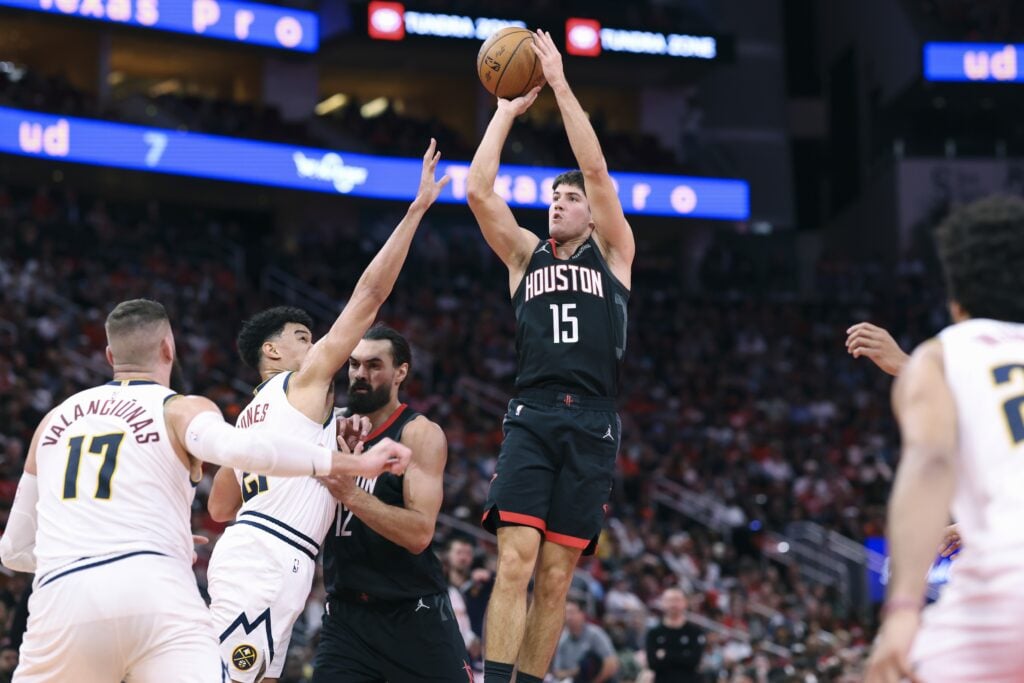The NBA Cup superstar clash between Denver’s Nikola Jokic and Houston’s Alperen Sengun didn’t go as Rockets fans would have hoped. The Nuggets won the NBA Cup showdown on Friday night, 112-109. With only one more group stage Cup game still to play, the Rockets’ chances of progressing now look slim. There was one positive takeaway from the game for Rockets fans, though: the Reed Sheppard leap looks real.
Rockets’ Sheppard Almost Carries With Career Night
Sheppard scored a career-high 27 points in the loss. He went 9-13 shooting from the field, 5-8 from three, and 4-6 from the free throw line. Such was his impact in the game that his minutes reached a season high of 36:45 despite coming off the bench. He stole the limelight to such an extent as to wind up the Rockets’ leading scorer.
Houston’s Stars Missed the Shuttle
The limelight was ripe for the taking, thanks to a shaky night from Sengun. The big man scored just 14 points on 6-14 shooting, to go along with five rebounds and six assists. He also had five fouls and four turnovers. Jokic unsurprisingly showed just how far ahead he is with 34-10-9 on 55% shooting. The Rockets did a good job of putting pressure on him defensively, at least, forcing him to 5 fouls on the evening. Even so, Jokic played over 39 minutes and swiped two steals and two blocks.
The Rockets were obviously conscious of the workload for Sengun, guarding the best player in the league and leading the offense. As such, they made the call to start fellow center Steven Adams, even if it meant Jokic wouldn’t have to guard Sengun, either. Also, now that Josh Okogie’s hot start that turned Houston’s season around has cooled off, Udoka’s instinct to go back to double bigs is clearly hard to resist.
The first impression from the box score is that the Rockets should have leaned more on the double big lineup with Adams. The Big Kiwi was a +14 on the night after all. However, in his 13 minutes sharing the court with Sengun, he was a -3.
Not a Double Bigs Problem
However, the truth is that whether Adams was out there or not, Jokic had understandably little interest in defending Sengun one-on-one. The Rockets were further hampered in punishing Denver’s defensive scheme by an off-night from Kevin Durant.
Durant shot just 5-15 from the field and was held to a surprising 13 points. Obviously, the Nuggets deserve credit for denying KD touches and access to his sweet spots. Even so, it’s rare for such intentions to pan out. In any case, Denver’s scheme of suffocating Sengun and denying KD did allow openings for others.
The Others Almost Landed The Ship
Jabari Smith Jr splashed in five of eleven three-pointers to finish with 21 points. Amen Thompson cut and muscled his way to 22 points by attacking Denver’s distracted interior. It’s hard not to focus on Houston’s leading scorer on the night, however. Sheppard was a game-changer for Houston. He was a +13 on the evening, which ballooned to +22 minutes over 14 minutes with Adams. Udoka attributed it to the duo playing together with pace in his postgame interview.
Indeed, Sheppard’s aggressive pursuit of his shot put Denver on the back foot. Even in a loss, it was the kind of game that should give him tremendous confidence going forward. Denver looks like one of the best teams in the league this season. Sheppard’s play was very nearly the key to beating them. The game came down to a drawn-out free-throw slog and a missed heave. It showed that Houston does have the personnel to take advantage of Sengun and Durant drawing extreme defensive attention.
Is it Just a Denver Thing?

One caveat for Sheppard is that Denver is a team that has historically struggled with containing jump shooters. Jokic can’t sag all the way off to the paint on screens because he struggles with players coming downhill at him. He can’t switch because he doesn’t have the lateral footspeed to stay in front of players in isolation. He therefore hedges, first trying to deny open jumpers and then sinking back into possible driving or passing lanes. He’s very good at it. However, it means that the Nuggets’ defense is constantly in rotations. Naturally, they have to prioritize protecting the rim, and so shooters get left open.
The Rockets took 36 total threes against Denver. That certainly doesn’t seem like very many in today’s NBA, but the Rockets average just 30.3 attempts per game so far in 2025-26. That’s despite (though also intrinsically linked with) them still leading the league in three-point percentage. Like Sheppard, the Rockets favor quality over quantity in their three-point looks.
Indeed, taking what the defense gives him is a core tenet of Sheppard’s game. Even so, the young sniper has had double-digit field goal attempts for the past seven games in a row. Over that time, he’s averaging 17.3 points, 2.1 rebounds, 3.1 assists, and 2.1 steals per game. He’s also been shooting 57.7% from the field and 53.2% from three. The Rockets are 5-2 in that span. What Sheppard is gradually realizing is that the defense “giving you” something just looks a lot different in the NBA than it does at lower levels.
The Last Word
Houston’s next game will be a partial reunion with Jalen Green (unfortunately out with injury) and Dillon Brooks of the Phoenix Suns. Rockets fans will be eager to see if Sheppard’s career night was enough to earn another shot at the starting lineup. Whether that’s the case or not, expect his high minutes to remain in place as a fixture of the normal rotation. Sheppard’s career night wasn’t quite enough to carry against Denver, but hopefully he’ll carry on careening into threes with abandon.
© Troy Taormina-Imagn Images
The post Rockets’ Sheppard Almost Carries With Career Night appeared first on Last Word On Basketball.